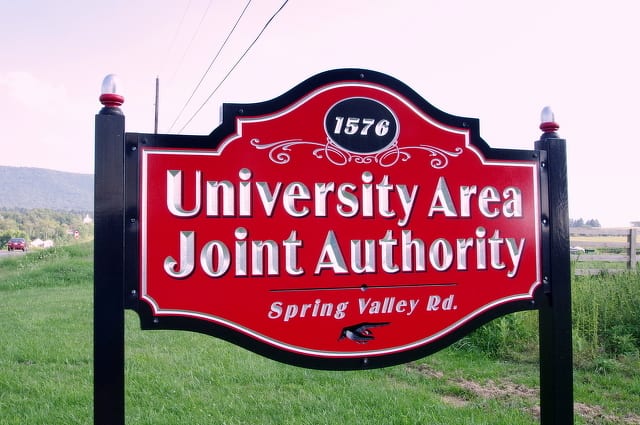State College Borough will pay the University Joint Authority nearly $2.6 million as part of an interim agreement in their two-year dispute over wastewater treatment billing fees. But customers in the rest of UAJA’s service area may still see a rate increase if the two sides can’t reach a final resolution before the end of the first quarter of 2025.
The interim agreement, which was approved by Borough Council on Monday and the UAJA board earlier this month, calls for State College to pay the disputed fees accrued since 2022 while the two parties continue negotiations for a final agreement. Borough Manager Tom Fountaine said it was the third time the borough offered to pay the fees since the dispute began.
“If the negotiations are ultimately unsuccessful, the borough’s litigation challenging UAJA’s rates will continue, and the borough is not waiving its challenge,” Fountaine said. “If the rates are determined to be unreasonable, UAJA will be responsible for reimbursing the Borough.”
UAJA Executive Director Cory Miller noted at a board meeting September that the interim agreement does not include payment of penalties and interest, which the authority is reserving the right to pursue as part of a final new intermunicipal agreement.
Despite the payment, UAJA is anticipating a rate increase for customers in parts of College, Ferguson, Harris and Patton Township. Miller said at meetings in September — and customers were recently notified — that an increase of $8 per quarter, from $113 to $121 per EDU, is planned.
The reason, Miller said, is that UAJA relies on revenue bonds for capital projects and must demonstrate to bond rating and insurance agencies it has sufficient revenue for debt payments and operating expenses. Though State College’s rate will also increase, UAJA cannot count on that increased income because the borough has continued to pay at its old, lower rate.
“Those entities are going to look at it and say, ‘That’s what the borough’s going to continue to do, so therefore you can’t count on that for purposes of your bond rating and bond insurance,’” Miller said in September. “So we need to anticipate that and show in the budget that we’re going to generate enough revenue from other sources to make up for the borough not paying their full share. The only way to do that for UAJA is to increase the rates for everyone else.”
For township customers, the rate increase will be reflected in their first quarterly bill of 2025, which will be sent out at the end of March, unless a new agreement is reached before then.
“If something happens between now and January 1, we can undo this in the budget process or we can undo it at a later point,” Miller said.
In 2024, UAJA raised customer rates by $5 per quarter, which Miller said was in part due to the borough’s underpayment, along with inflation and a slow-down in construction. State College’s rate also increased this year by $7 from $66 to $73 per EDU.
Unlike the rest of the service area, State College operates its own sewage collection system and transports it to UAJA for conveyance, treatment and disposal. As such, the borough is UAJA’s only wholesale customer among approximately 14,000 served by the region’s primary wastewater treatment authority.
Since the fall of 2022, the borough and UAJA have been embroiled in litigation over how State College is billed for conveyance and treatment. After a long-term agreement that billed the borough based on actual meter flow expired, UAJA enacted a new billing rate for 2022 based on EDUs, a method that charges a rate for capacity instead of actual flow that the authority uses for its retail customers.
The change resulted in a spike in the borough’s quarterly billing, and State College continued paying at its rate under the old method, arguing UAJA could not unilaterally decide the new payment. After negotiations failed, UAJA filed a lawsuit in October 2022 seeking, at the time, $406,088 in service charges and late fees withheld by the borough, contending its refusal to pay is “unlawful and unauthorized” under the Municipal Authorities Act.
The borough countersued, claiming not only that UAJA improperly imposed new rates for wholesale sewage treatment, but also overcharged the borough in the past by more than $6 million for services it did not use.



